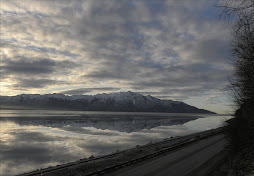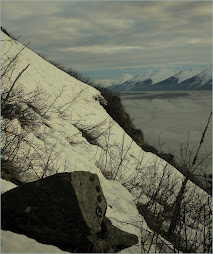 Along the open south slopes of the mountain, fields of lupine spread a blue haze of color across a canvas of greens and greys: the June colors introduced also a palette of yellow, whites, reds, and blues, fresh and pure. Flowers of all shapes sprinkled in a mixture of accents to the blazing fields of blue. I wandered through this garden of delights, slowly sipping like water the vast array of details, feeling lost in aimless wonder. How long had I been here? Fifteen minutes or one hour; it didn't matter, because time shaped itself in filling or emptying the experience, not like a clock or linear measure, but a breathing in and out of the moment's flow. This reminded me of a Biblical reference from Revelations 10:6 "that there shall be time no longer." And the urge to rush or be at some destination seemed pointless, when all about me, a grand vision of beauty and harmony opened and sprung into existence, disclosing the mysterious workings of a universal mind in nature. Soon I left the footworn trail, descended down the hill, and followed instead an old animal path. Here the sounds of birds, the cool wind on the skin, and off trail sights gave way to new surprises: large fields of lupine meandered around the cottonwoods and birch, between the alder areas, and clustered in large shapes and lines. But something else drew my eyes to one spot. Among the blues of lupine, a small area of white lupines contrasted as night to day. This rare sight rewarded my wanderings in this place. Sometimes, by not having a goal or direction, but guided by a passion of mind, the treasure finds the seeker. This particular variety of natural selection intrigued me. The colors of the Lupine ranged in two directions from the central blue-white: towards red-white and white-yellow. The potential for adaptation and change were suggestive of these minority variations. For now, I was surrounded by a beauty of expression, of life's unfolding in cyclical sway; but soon I realized, that even this stream would dry up, while another come along and take its place.
Along the open south slopes of the mountain, fields of lupine spread a blue haze of color across a canvas of greens and greys: the June colors introduced also a palette of yellow, whites, reds, and blues, fresh and pure. Flowers of all shapes sprinkled in a mixture of accents to the blazing fields of blue. I wandered through this garden of delights, slowly sipping like water the vast array of details, feeling lost in aimless wonder. How long had I been here? Fifteen minutes or one hour; it didn't matter, because time shaped itself in filling or emptying the experience, not like a clock or linear measure, but a breathing in and out of the moment's flow. This reminded me of a Biblical reference from Revelations 10:6 "that there shall be time no longer." And the urge to rush or be at some destination seemed pointless, when all about me, a grand vision of beauty and harmony opened and sprung into existence, disclosing the mysterious workings of a universal mind in nature. Soon I left the footworn trail, descended down the hill, and followed instead an old animal path. Here the sounds of birds, the cool wind on the skin, and off trail sights gave way to new surprises: large fields of lupine meandered around the cottonwoods and birch, between the alder areas, and clustered in large shapes and lines. But something else drew my eyes to one spot. Among the blues of lupine, a small area of white lupines contrasted as night to day. This rare sight rewarded my wanderings in this place. Sometimes, by not having a goal or direction, but guided by a passion of mind, the treasure finds the seeker. This particular variety of natural selection intrigued me. The colors of the Lupine ranged in two directions from the central blue-white: towards red-white and white-yellow. The potential for adaptation and change were suggestive of these minority variations. For now, I was surrounded by a beauty of expression, of life's unfolding in cyclical sway; but soon I realized, that even this stream would dry up, while another come along and take its place.
Saturday, June 6, 2009
The Time of the Lupine
 Along the open south slopes of the mountain, fields of lupine spread a blue haze of color across a canvas of greens and greys: the June colors introduced also a palette of yellow, whites, reds, and blues, fresh and pure. Flowers of all shapes sprinkled in a mixture of accents to the blazing fields of blue. I wandered through this garden of delights, slowly sipping like water the vast array of details, feeling lost in aimless wonder. How long had I been here? Fifteen minutes or one hour; it didn't matter, because time shaped itself in filling or emptying the experience, not like a clock or linear measure, but a breathing in and out of the moment's flow. This reminded me of a Biblical reference from Revelations 10:6 "that there shall be time no longer." And the urge to rush or be at some destination seemed pointless, when all about me, a grand vision of beauty and harmony opened and sprung into existence, disclosing the mysterious workings of a universal mind in nature. Soon I left the footworn trail, descended down the hill, and followed instead an old animal path. Here the sounds of birds, the cool wind on the skin, and off trail sights gave way to new surprises: large fields of lupine meandered around the cottonwoods and birch, between the alder areas, and clustered in large shapes and lines. But something else drew my eyes to one spot. Among the blues of lupine, a small area of white lupines contrasted as night to day. This rare sight rewarded my wanderings in this place. Sometimes, by not having a goal or direction, but guided by a passion of mind, the treasure finds the seeker. This particular variety of natural selection intrigued me. The colors of the Lupine ranged in two directions from the central blue-white: towards red-white and white-yellow. The potential for adaptation and change were suggestive of these minority variations. For now, I was surrounded by a beauty of expression, of life's unfolding in cyclical sway; but soon I realized, that even this stream would dry up, while another come along and take its place.
Along the open south slopes of the mountain, fields of lupine spread a blue haze of color across a canvas of greens and greys: the June colors introduced also a palette of yellow, whites, reds, and blues, fresh and pure. Flowers of all shapes sprinkled in a mixture of accents to the blazing fields of blue. I wandered through this garden of delights, slowly sipping like water the vast array of details, feeling lost in aimless wonder. How long had I been here? Fifteen minutes or one hour; it didn't matter, because time shaped itself in filling or emptying the experience, not like a clock or linear measure, but a breathing in and out of the moment's flow. This reminded me of a Biblical reference from Revelations 10:6 "that there shall be time no longer." And the urge to rush or be at some destination seemed pointless, when all about me, a grand vision of beauty and harmony opened and sprung into existence, disclosing the mysterious workings of a universal mind in nature. Soon I left the footworn trail, descended down the hill, and followed instead an old animal path. Here the sounds of birds, the cool wind on the skin, and off trail sights gave way to new surprises: large fields of lupine meandered around the cottonwoods and birch, between the alder areas, and clustered in large shapes and lines. But something else drew my eyes to one spot. Among the blues of lupine, a small area of white lupines contrasted as night to day. This rare sight rewarded my wanderings in this place. Sometimes, by not having a goal or direction, but guided by a passion of mind, the treasure finds the seeker. This particular variety of natural selection intrigued me. The colors of the Lupine ranged in two directions from the central blue-white: towards red-white and white-yellow. The potential for adaptation and change were suggestive of these minority variations. For now, I was surrounded by a beauty of expression, of life's unfolding in cyclical sway; but soon I realized, that even this stream would dry up, while another come along and take its place.
Subscribe to:
Post Comments (Atom)



No comments:
Post a Comment